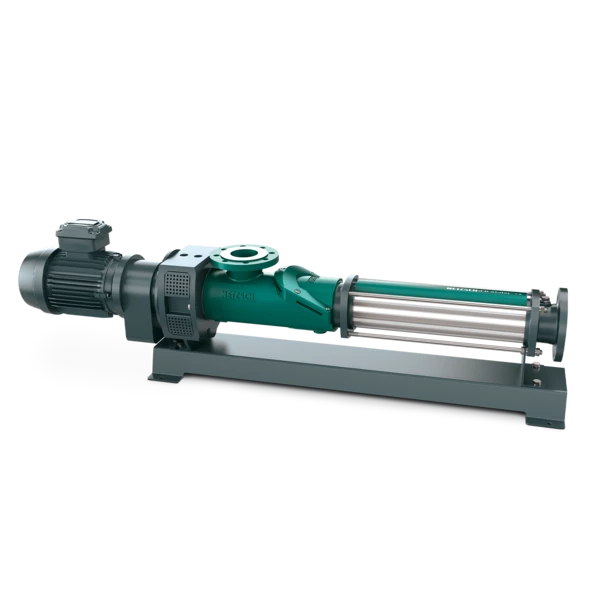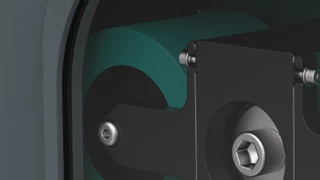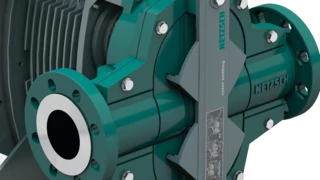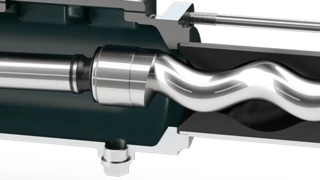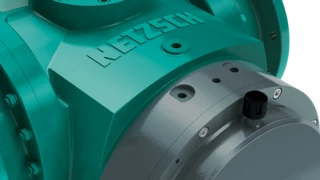
Asphalt & Bitumen Pumps
Pumps for Asphalt, Bitumen & Tar Applications
NETZSCH pumps and systems manufacture progressing cavity pumps to transfer abrasive asphalt, bitumen & tar in order to make instant repairs for road surface damage. This is a long-lasting asphalt pump wear-reduction technique. Netzsch Pumps are used in bitumen and tar applications for various purposes within the industrial and construction sectors. Bitumen and tar are highly viscous substances that require specialized equipment for handling and processing.
Netzsch Pumps, known for their reliability and efficiency, play a crucial role in these applications. However, the variety of different pump types is enormous. NETZSCH offers ideal pumping solutions to transfer the high range of viscosities of different asphalt, bitumen, and tar applications.
As a global specialist in complex fluid management, NETZSCH Pumps & Systems has a broad product portfolio and the expertise to support you in choosing the right pump solution for asphalt applications. Our experts will work with you to find the optimum pump for your application. We will show you how bitumen pumps are working and to avoid unplanned downtimes and sustainably increase your productivity efficiency when pumping asphalt, bitumen & tar.

Individual Consulting

How the bitumen pumps are used locally and how long it takes to open the route to traffic
Netzsch Pumps are used for transferring bitumen and tar from one location to another within the processing plant or from the storage tanks to transportation vehicles. The pumps are designed to handle the high viscosity of these substances efficiently.
Whether car drivers, motorcyclists, heavy lorry drivers, or cyclists, everyone knows about the problems road potholes cause. According to the federally owned Autobahn GmbH, in 2023, there will be 552 road works on German motorways alone, causing traffic jams and loss of time. But not every closure necessarily has to last long.
To reopen the streets for traffic as quickly as possible in the case of minor road damage, a Dutch company has developed a unique technology. A fast-curing synthetic resin-based repair asphalt is mixed and applied directly on-site on a particular vehicle. The major advantage of this method is that the road can be cleared for traffic after less than an hour.
Challenges to consider when transferring asphalt, bitumen & tar.
To prepare the special mortar, cold asphalt is transported directly on-site on a particular vehicle from a tank with a stirring unit to a static mixer and pumped through it. Afterwards, the same vehicle shovels gravel from a reservoir over the cold asphalt.
For the first step, conveying the mixture of resin, sand and silver sand, a rotary lobe pump was previously used, which had to be operated at speeds of around 250 to 300 revolutions per minute. This led to high pulsations and increased wear due to the very abrasive medium. The elastomer lobes were particularly affected. They had to be replaced by a specialist every two to three weeks. As a result, the vehicle was often out of order.
This resulted in high downtimes and enormous costs for the Dutch company. The appropriate pump from NETZSCH provided the remedy. The specialist for pumping complex media has the optimal solution in its portfolio for reducing unplanned downtimes and, thus, your maintenance costs.
Reduce your downtime with this asphalt pumps!
Choosing the right pump depends on many factors, such as the pumped medium, flow rate, pressure, viscosity or temperature. After thoroughly analyzing the requirements and operating conditions, NETZSCH advised the Dutch company to replace the rotary lobe pump previously used to convey the cold asphalt with a NEMO® progressing cavity pump in FSIP® design.
Progressing cavity pumps offer gentle conveying with little shearing and pulsation. This makes the NEMO® particularly suitable for pumping cold and viscous asphalt on the repair vehicle. A large pump model has been selected which makes optimum use of the space on the vehicle and, at the same time, ensures the lowest possible rotation.
This allows for prolonged and precise pumping at 50 to 75 revolutions per minute. At the same time, the delivery rate could be doubled to one cubic meter per hour. This significantly increased the efficiency of the plant of the Dutch specialist for road repairs.
Precise metering and dosing of bitumen or tar are essential in various production processes. Netzsch Pumps are capable of providing accurate and consistent flow rates, ensuring that the right amount of material is delivered for blending, mixing, or other manufacturing processes.
Thanks to the stainless steel components and the EPDM (ethylene propylene diene rubber) elastomer parts, the asphalt pump works without any problems. In addition, service and maintenance work can easily be carried out on the selected model. When changing the stator, you can save up to 66 percent of working time thanks to the innovative FSIP® design. All wearing parts can be replaced in less than half the previous time. However, the progressing cavity pump offers another decisive advantage in pumping asphalt.
Since it works trouble-free compared to the previous pump, it has a positive effect on the operating times of the machine but also on the curing time of the asphalt to be repaired. Due to the coupling rod's auger flights, the medium's components are continuously mixed well with each other. Thus, the thorough drying of the mortar is completed in a shorter amount of time. Thanks to choosing the right asphalt pump for pumping the asphalt, the roads can be opened to traffic even sooner.
NEMO® progressing cavity pump in FSIP® design
- Medium: Mixture of resin, sand and silver sand
- Speed: 50 to 75 rpm
- Flow rate: 1 m³/h
- Temperature: 20 °C
- Pressure: 5 bar
- Viscosity: 7,000 to 10,000 mPas
